
“I have been kidnapped.”
Our Boys begins with these words, whispered by a boy communicating his kidnapping to the police in real time. The words reference the news about three Jewish Israeli boys — Naftali Frenkel, Gilad Shaer, and Eyal Yifrah — who were kidnapped from Gush Etzyion in the West Bank on June 12, 2014. As the screetchy signals of an audio recording play over a mostly blank screen, we are invited to engage our ears, then our eyes, and finally our full affective system in these history-making events, which are also a recent memory.
“In Israel, everyone remembers where they were when news of the kidnappings broke,” reads a line from the coverage of the premiere screening of Our Boys hosted by the New York Times in August 2019. I do remember that Friday night when, a few hours after its occurrence, we heard about the kidnapping. It was my younger brother’s birthday and, as is rarely the case in our ever-immigrating Mizrahi Turkish Israeli family, we were all in Tel Aviv. Right as the four of us — my brother, our parents, and me — got in the car and started driving to take our birthday boy out to dinner, the radio announced the news. I remember when all of our ears perked up instantly, simultaneously, toward the voice of the newscaster who cradled us in Israeli Modern Hebrew’s favorite state of announced emergency. In this moment of physical closeness and shared attention, the news seemed to concern us all, triggering that deep tissue in our bones where once settled Zionist-Israeli indoctrination still dwells.
But the rest of Tel Aviv was business as usual, and we were going out for dinner anyway. And shortly after that I was going to go visit Istanbul, where we are from, and then head to Brooklyn, where I have been living for some time. My brother was going to relocate to London. We, in our traditional diasporic ways, were going to keep dispersing.
But Our Boys is not primarily about us, where “us” means the common and generalized understanding of “Israeli Jews.” Our Boys also revisits the July 2, 2014 kidnapping and murder of Muhammad Abu Khdeir, the 16-year-old Palestinian boy from Shuafat, Jerusalem who was killed at the hands of three Jewish Israeli young men. An act of vengeance, the horrendous burning to death of Muhammad in the Jerusalem Forest took place right after the three kidnapped Jewish Israeli boys were found dead. As Our Boys conveys, the subsequent events of kidnapping and murder and the unrest around it in Jerusalem and beyond substantially informed the context for Israel’s assault on Gaza in the two months to come. But that massive atrocity is largely left outside of the frame.
Further, Our Boys was not primarily created for the “us” of Israeli Jews. Never slotted for prime time broadcasting, Our Boys received press attention in Israel mainly due to the Israeli television industry’s pride about the accomplishment of the show: It was the first Hebrew and Arabic speaking Israeli production filmed locally and commissioned, produced, and presented by the television giant HBO. PM Benjamin Netanyahu’s subsequent condemnation of it only increased the buzz.
US-American HBO producers initiated the creation of Our Boys by reaching out to Jewish Israeli celebrity television creator and producer Hagai Levy and the Tel Aviv-based Keshet Studios in 2015 with an unprecedented offer for Israeli television: to co-produce a show about the killing of Muhammad Abu Khdeir based on the New York Times’ coverage of the event. Levy then invited Jewish Israeli filmmaker Josef Cedar to co-create and co-executive produce the show alongside him. He also asked Taufik Abu Wael, a Palestinian filmmaker with Israeli citizenship (or, a 1948 Palestinian filmmaker) to join the team — but solely as a co-creator. Premiering on HBO in August 2019, Our Boys was thus made with a US-based audience in mind and distributed through the US imperial map of HBO streaming services to spectators with access. As Levy emphasized, Israeli television received unprecedented access to substantial funds and a dream trip to America. We spectators, in turn, received a trip away from our memories of this recent event as manufactured in the Jewish Israeli mainstream media and public psyche (and often in the US too).
So Our Boys was created within the paradigm of the co-production and thus premised on an alliance between the culture industries of Israeli and US-American settler colonial state regimes, prioritizing the authority of the Jewish-Israeli executive producers. Nevertheless, the episodes consist of ample moments that de-center the conventional viewpoint, master narrative, and collective memory of Jewish-Israeli identity that we are accustomed to watching on Israeli — and Israeli/US-American — film and television. Many scenes dedicate time to delineating the rifts and encounters between two communities that rarely receive dignified representation on film and television: Palestinians and Mizrahim, specifically those living in and around Jerusalem.
Our Boys focuses on the events of the investigation and court case of the three Jewish Israeli young men who murdered Muhammad through the perspective of two unique protagonists. The first is Hussein Abu Khdeir, Muhammad’s father, who leads the fight to hold his son’s murderers accountable, climbing immense hurdles that the Israeli legal and security system place against him. The second is Simon, a detective working for the Shabak, Israel’s Security Agency, where he investigates and brings to trial Muhammad’s murderers. The Abu Khdeir family and their Palestinian community, and Simon and his Mizrahi family and community — which includes the three murderers, all negotiate space, language, survival, loss, and, crucially, the mechanisms (and violence) of the Israeli state. Focusing on these protagonists and their communities allows the show to push against the structural power imbalance embedded in the setup of the Israeli/US-American co-production.
In what follows, I will offer some notes about Our Boys in the form of a travelogue along the journey on which the show invites us to embark: from Tel Aviv to New York, New York to Jerusalem, and Jerusalem to Istanbul. The show encourages viewers to revisit places and embodied locations and refresh, reroute, and reorient our affective archive of short-term memory — so short-term it almost counts as history in the making.
Our Boys grounds us in an experience of rethinking recent memory by reconsidering the events, asking us to pay close attention to what we are seeing, watching, hearing, and listening to, and to how we process and archive events through sensorial and affective absorption. As actual footage from the summer of 2014 blends with a fictional retelling, we are invited to look and closely experience powerful scenes of Palestinian and Mizrahi representation. Indeed, the Palestinian and Mizrahi characters in Our Boys inhabit the apparatus of the Israeli/US-American co-production, which is built on and reiterative of the real-life conditions of settler-colonialism and ethno-racial supremacy. This framing manifests itself, for example, by legitimizing the Israeli legal and security state mechanisms featured in the show. Yet just as in any reality of settler-colonialism and ethno-racial supremacy, there are also ample everyday moments of human resilience and resistance. By portraying these moments, the show invites us to challenge its framing via an Israeli-US/American alliance. In Our Boys, the foregrounding of Palestinian and Mizrahi characters creates scattered yet effective cracks in the underlying apparatus of the American/Israeli pact — the same apparatus executing its powers on the ground and on screen.
i. Tel Aviv → New York; or, Muhammad and Hussein
We meet Muhammad Abu Khdeir for the first time about one minute into the pilot episode, as he watches the Israeli television reports about the June 12 kidnapping. Refreshing our memory of the events of the kidnapping, or, actually, of how we received the news about the events, Our Boys introduces us spectators to Muhammad and to the other main protagonists while they engage in spectatorship themselves. They, like us, are similarly attuned to Israel’s mainstream media channels and how they deliver the news. For a quick yet crucial moment at the very outset, Muhammad appears as the first person to observe the unfolding and narrating of the events, his viewpoint thus estranging and informing the manners of mediation of the Israeli news. His father Hussein, who we meet right after, asks Muhammad to quit the news and join the family for dinner.
The next time we meet Muhammad he is also with his father. This time he is taking a break from work to text his friend, Toto, who he plans to meet in Istanbul. It is a trip his father previously promised to cover. Muhammad is dreaming of Istanbul when Hussein again calls him back to reality — the reality of their labor as construction workers in the service of Jerusalem’s ever-devouring Jewish supremacy. Amidst these negotiations between the realities and representations of the Israeli occupation, the intimate relationships and delicate threads of communication between Muhammad, Hussein, his brother Iyad, and his mother Suha are caringly depicted, illuminating the everyday lived experiences of the Abu Khdeir family and their community during Ramadan in Shuafat.
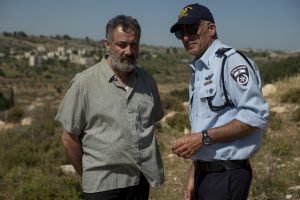
Built on our immediate attachment to the Abu Khdeir family, the first three episodes of Our Boys are difficult to watch, for they meticulously depict the torture the family goes through in the face of losing Muhammad. Focusing on Hussein, the show breaks down how the unbearable pain of losing Muhammad is exacerbated by the Israeli security system — the police and the Shabak — which does all in its power to dismiss and deny vehemently the very probable possibility that the murderers are Jewish. Hussein and the family battle the cops, enduring excruciating hours at the police station and persistently demanding that the investigation consider all possible scenarios, including the very obvious one: that the murderers sought to avenge the prior killing of the three Jewish boys. Later on, when the Jewish Israeli murderers are tracked and detained, Hussein and the family resist the triumphant narratives attempting to portray the trial as an achievement of the Israeli Jewish justice system, which disregard and co-opt Hussein, his family, and his community’s tireless struggle.
Our Boys thus highlights the excruciating Palestinian fight for basic accountability and justice, in the midst of mourning and rage. In a groundbreaking move, the show acknowledges the family at its center rather than the state’s righteous actions. This representation of Palestinian humanity, family, and pain is highly unusual in Israeli/US-American shows. Our Boys stands out in a sea of Zionist-oriented Israeli television productions recently purchased for or adapted to US-based platforms. Since 2008, a time that saw the rapid increasing popularity of streaming services, more and more Israeli television shows have drawn interest from US networks such as HBO and Netflix. The recent wave of collaborations between the US and Israeli television industries includes adaptations such as HBO’s In Treatment (also originally called In Treatment, 2005), Showtime’s Homeland (originally Prisoners of War), and HBO’s Euphoria (also originally Euphoria, 2012); American and European productions featuring Israeli co-creators such as The Spy (Netflix and CSO); Israeli television shows licensed for distribution in the US such as Fauda (Yes and Netflix), Valley of Tears (Kan 11 and HBO Max), and Tehran (Kan 11 and Apple TV). Many of these shows focus on military and security operations, celebrating the infamous “war on terror” paradigm, and reiterating settler-colonial, ethnonationalist, and orientalist premises. Others focus on other themes, at times with light mentions of a “war” and/or “terrorism” happening somewhere far away.
Yet unlike Ava Duvernay’s When They See Us (2018) which is comparatively cited by the abovementioned Times article, or more recently, Steve McQueen’s Small Axe) Our Boys cannot be considered a self-represented Palestinian story told through the primary lens of a Palestinian filmmaker. In fact, the setup of the Israeli/US-American co-production was hardly manageable for Tawfik Abu-Wael. In Levy’s words, “I brought in Joseph as a director, and he became a co-creator. Then we brought in Tawfik because a very big part of the story is about the Palestinians, and we wanted one of the creators to be Palestinian.” Praises for Abu-Wael are certainly due for his important role in crafting a compelling Palestinian narrative in Our Boys (as well as his longtime, globally acclaimed contribution to Palestinian cinema). Yet his role in Our Boys came with a major personal toll: Abu Wael was criticized for his participation in an Israeli/US-American co-production all while he struggled to center the Palestinian viewpoint on the set, which required near constant conflict with the more powerful Jewish-Israeli co-creators and executive producers. The fact that Abu Wael had to endure so much hardship for his work on the show — while already living it everyday as a Palestinian filmmaker, generally — exemplifies the tokenizing problems of today’s globally commonplace politics of inclusion and diversity in television and film.
Beyond Abu-Wael, though, the representation of the Abu Khdeir family and their community is first and foremost indebted to years of Palestinian, indigenous, and Black self-representation and organizing.
On that note of acknowledgement, a few words are due here about the lifetime work of Arab-American scholar and activist Jack G. Shaheen. His dedicated advocacy for humanizing Palestinian representation, especially as part of his extensive study of the history of Israeli/US-American film and television collaborations, contributed to making Our Boys possible. In his meticulous outlining of the vilifying stereotypes of Arabs in US pop culture and media at large, Shaheen protested and made visible the harmful portrayal of Palestinians, which, even as they have almost always been represented as nameless and faceless “terrorists. was almost never recognized as such. ” For example, US-based and Israeli-directed film production initiatives, such as the company Cannon Films, promoted such harmful Palestinian representation while receiving support from the Israeli government and investing in developing the entertainment industry in Israel.
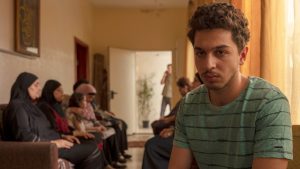
Shaheen’s monumental work sheds important light on Our Boys as a contemporary iteration of the myriad of Israeli/US-American historical attempts to represent Palestinians in popular culture. Shaheen’s insistence that portraits of Palestinian family and love are essential to humanizing them on the screen is materialized in Our Boys. The scenes of Muhammad’s brother Iyad participating in the uprisings in Jerusalem after Muhammad goes missing is a significant improvement from the longtime stereotype of the death-driven Palestinian terrorist. While avoiding romanticization, Iyad’s protest is placed in the context of family, love, and a shared humanity.
More broadly, Shaheen taught us how to closely watch these Israeli/US-American portraits of Palestinians. In a note he made about Exodus and Black Sunday, Shaheen remarks in what sounds like an enraged voice, “No such people as Palestinian Arabs, this word is never used.” Yet Shaheen did exactly that — he persistently renamed Palestinian representation as such. An avid spectator, Shaheen’s repetitive notes are a testimony to his practice of re-watching, reliving, reinterpreting, and reclaiming. His practices are helpful to remember as we watch Muhammad’s eyes light up the screen while he watches Israeli mainstream media in the very first minutes of Our Boys. The vast history of Palestinian and Arab writing, organizing, and self-representation are essential references when we think of Hussein’s successful attempts at resisting the security and legal system’s racist assumptions about Palestinians, and, especially, when he prevents the cooptation of his struggle to celebrate the Israeli justice system.
The powerful Palestinian filmmaking, acting, narrating, and overall resilient representation foregrounds and names, as well as breaches and reaches beyond, the show’s ultimate legitimization of Israel’s security and legal capacity to bring murderers to just trial and punishment. The Palestinian characters of the Abu Khdeir family push against the delimiting circumstances informing the making of Our Boys as an Israeli/US-American co-production, created amid the racialized professional hierarchy between Levy and Cedar on the one hand and Abu Wael on the other.
ii. New York → Jerusalem; or, Simon and Avishay
The introduction of the characters in Our Boys’ first episode situates us in Jerusalem, the center of events, as we travel across the contested greater area of the city, its outskirts, and parts of the West Bank. Right after we meet Muhammad for the second time, while he overlooks Baqa in West Jerusalem from a construction site, we get to know the Mizrahi characters of the show: the murderers, cousins Avishay and Yinon (aliases); their uncle Yosef Haim Ben David; and the detective, Simon, who is after them. Unlike Palestinians, they all travel freely and swiftly through Har-Nof, Shuafat, Adam, and the Jerusalem Forest, where the murder occurs. Alongside the portraits of the Abu Khdeir family members, Our Boys focuses on the emotional and spiritual lives and mental health struggles of the detective and the murderers — in particular 16-year-old Avishay. There is brief attention paid to their racialized positions as Mizrahim within a white Ashkenazi-dominated religious and political world. The intimate encounters between Avishay and Simon move the story forward, all occurring in a recognizable yet mostly unnamed Mizrahi context.
Mizrahim, too, are often portrayed in a racializing, orientalist manner as backward and uneducated — which makes Our Boys unique once again. As scholar Ella Shohat showed, harmful representation of Mizrahim appeared in much of 20th century Israeli cinema, and in Israeli/US-American film collaborations too. At times, as the famous example of the 1964 Academy Award nominee Salah Shabati reminds us, US popular culture explicitly celebrated the racist portrayal of Mizrahim. Historically, Mizrahim were commonly cast as outlaws, spies and state agents, which remained true in The Spy, Tehran, Valley of Tears. In Our Boys, too, albeit in a more critical and politicized manner. All of these shows mark a shift in the representation of Mizrahim, as they explore our histories and lives more intentionally. To address the Mizrahi context, Our Boys focuses on the relationships between Mizrahim and the state, their Arab-Jewish traditions, Palestinians, and one another. Similar to the Palestinian representation in Our Boys, which builds on years of Palestinian creative-political work, the credit for this shift goes to years of Mizrahi organizing and self-representation. Shlomi Elkabetz, a filmmaker and champion of this work, plays Simon in Our Boys, making his acting debut. The show’s creators have described him as “valuable as a collaborator.”
Alongside Muhammed’s father Hussein, the centralized perspective of Simon gives us a glimpse into the lived realities of Mizrahi Haredi settlers and, by extension, the political conditions of Mizrahi lives in Israel, including the formation of their identity in relation to and at the expense of Palestinian lives.
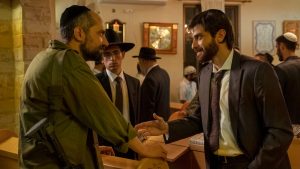
From the start, Simon is the only detective to take seriously the likelihood Hussein repeatedly asserts: that Muhammad’s murderers are Jewish Israeli. He actually listens to Hussein and the other residents of Shuafat; his patiently filmed calmness when facing the question of whether the kidnappers are “Jews” or “Arabs” insinuates a more nuanced understanding: they could be Arab Jews. Simon’s spoken Arabic, while commonly and notoriously utilized by Israeli security agents, is also associated with his identity as Mizrahi, as he speaks Arabic with his mother too. Additionally, his disputes and negotiations within the Shabak are notably racialized. He is often mistreated and misunderstood, to the point that he often finds more social and cultural affinity with the murderers on whom he is spying — the murderers to whom he is connected through family and community.
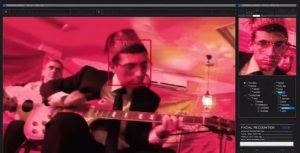
As an undercover agent, Simon forms a warm relationship with Avishay in order to expose the crime and bring him, his cousin, and uncle to trial. Implicitly, Simon also uses this opportunity to return to the spiritual world of his Mizrahi Haredi family and community, which overlaps with that of Avishay and with which he otherwise has little contact. Simon rejects many of his community’s religious practices and political, anti-Palestinian views. One of the show’s most haunting scenes, which juxtaposes the viewpoints of Hussein, Simon, and Avishay together, is worth reviewing. Sitting in the midst of family at his home, Hussein stands up to receive the phone call from the police confirming the corpse as his son’s, and, as he slowly sits back, a few heavy seconds of complete silence land on the screen. At that point, the aggressively comprehensive surveillance, phone tapping, and facial recognition systems planted all across Jerusalem, and subjecting mostly Palestinians, take us and the Shabak agents, amongst them Simon, straight to Muhammad’s suspected murderers. Here, Simon meets Avishay for the first time, through an array of screens. We cannot hear what Hussein had just heard on the phone, probably in Hebrew, but can only assume the worst. Instead, we vividly experience the murderers playing the song “Et Dodim Kala” — a time of joy for the bride — at a wedding. They play a version of the song by Zohar Argov, which is easily recognizable as a popular one in Israel’s Mizrahi music scene and is rooted in a long Arab-Jewish tradition.
Thus, Our Boys frames the ethnocultural affinity of Palestinians and Mizrahim to Arab language and sounds as fraught, fraught with deadly power imbalances and painful conflicting breaches. We experience this affinity as a series of stark, quick, and dizzying transitions: first, a shift between gazing at the murderers and at Jerusalem through the lens of the state’s controlling means of vision, to an intimate audial engagement, and then to within the sonological attentive space, between a lethal silence and the loud celebratory sounds of joy.
The next time we hear that same song is after Avishay’s detainment, as Simon brings him to reconstruct the night of the murder in front of the Shabak’s cameras. The scene alternates between the reconstruction, where Simon is present, and some of Avishay’s flashbacks from that day, one of them including all three murderers traveling around Jerusalem looking for a Palestinian boy to kidnap as they sing “Et Dodim Kala.” Later on, they play music in the car and an Arabic song by Egyptian Umm Kulthum comes on. Yinon and Yosef Haim are surprised to find the song familiar from their religious practice and join in while chanting the lyrics in Hebrew. “You get it? They took our tune and turned it into a song of Arabushim [a derogatory term for Arabs],” says Yosef Haim. “Believe me, it’s so rude,” Yinon affirms. Avishay, however, questions that explanation, asking, “perhaps it’s theirs and we copied from them?” Yinon dismisses the suggestion.
Ironically compatible with the casting of Mizrahim as spies, music, voice, and sound here serve as secret infiltrators, cracking fissures in the omnipotence of the visual occupation that caught the murderers and implicitly celebrated in the show. Our Boys also attunes our ears and hearts to moments of Mizrahi interpersonal intimacy, Arab Jewish culture, and recognition of racialization — all formative of Mizrahi lives. “A little mental health problems, a little racism, that’s all it takes [to conduct murder],” Simon states at one point. He personally feels the racialized lives that both he and the murderers inhabit. Intuitively, through song, Avishay gets it too.
On one hand, Our Boys elevates the state’s legal and security system: the arduous and contested homosocial relationship between Simon and Avishay serves as the human terrain upon which Our Boys almost exonerates the state, justifies its existence, and reinforces the framing definition of the US-American/Israeli co-production. Mizrahim here are both the violent perpetrators and the savior capturers, mitigating structural state violence and reiterating the trend of using Mizrahim to extend, humanize, and legitimize the Israeli colonization and occupation of Palestine. At the same time, the scenes that highlight the ways in which Mizrahim have to survive and resist the Zionist and Ashkenazi state and its religiously-entwined hegemonies plant the seed for more potential learning and unlearning, encouraging us to see the murderers as more than religious extremists, or “bad apples,” but, rather, as the fruit of their racialization as Mizrahim in Israel/Palestine. This is an invitation to dive deeper into the layers of segregating racialization that placed Palestinians and Mizrahim on an imaginary Arab-Jewish binary and intentionally instigated their animosity.
While traveling freely across Jerusalem by virtue of their Jewish privilege, the Mizrahi characters seem otherwise stuck en route to nowhere — cramped in a car, driving in circles, in a suffocating place that trapped them. Or rather, to drive my point home, this place confined us to a political reality of fixed, assigned roles, suffocating, downgrading, and exploiting our livelihood to continuously boost and secure Israel’s colonization and occupation of Palestine. In 2021, as in 2014, we Mizrahim must continue to navigate frantically between our deep connection to families and communities, who have not had full agency in choosing their location or livelihood in Israel/Palestine, and trying to disperse.
iii. Jerusalem → Istanbul; or, Suha and Toto
The trials of Yosef Haim, Yinon, and Avishay end in convictions for murder. Yet, Our Boys does not end with that adjudication nor celebrates a conclusive note of victory or justice. Rather, the show extends its storyline, resisting an emancipatory foreclosure even as it does come to a close. Instead, it symbolically ends with the Palestinian and Mizrahi protagonists finding themselves outside of the borders and confines of the state of Israel. Simon has to leave the confines of the state and go to New York. He is targeted by Jewish Israelis who disapprove of his investigative work, which they see as “un-Jewish,” and threaten his life. He must run away, for Israel cannot accommodate him as he is, given his Arab-Jewish cultural identity and political conviction.
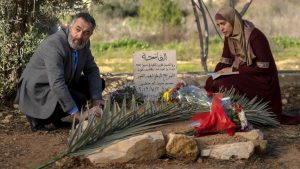
As for the Abu Khdeir family, Our Boys allows us to spend more time with them and their experience of life after loss — a life that was never delimited by the confines of the outlook and occupation of the state of Israel in the first place. “Is there a punishment that could ease the intolerable pain for the loss of Muhammad in such an atrocious way?” Hussein asks.
The show now takes us to Istanbul, Turkey, where Hussein and his wife Suha travel for a memorial in honor of Muhammad, and where Hussein is scheduled to give a talk. Suha, however, wishes to get off on the way to the memorial: she is planning to meet with Toto, that same friend with whom Muhammad was going to meet up in Istanbul before he was killed. We see Suha texting Toto on WhatsApp, like Muhammad used to do. Yet while coming close to meeting her face-to-face, Suha withdraws at the last minute and continues to walk on her own, until finally arriving at the memorial. Our Boys closes with the tears of Muhammad’s lamenting mother, who tried to trace the path he would have taken in the future that he never got to live.
While Istanbul will always remain an unattainable destination for Muhammad, Suha and Hussein’s visit there is Our Boys’ way of gesturing toward the geographies of solidarity and threads of connectivity in the Middle East that still exist despite hyper-nationalization, conflict, settler-colonialism, and imperialism. While taking us on a journey to contest our short-term memory, Our Boys ends with a glimpse at the layers of long-term memory underlying the post-Ottoman world. Watching Our Boys, we enter the chilly, muddy waters of our short-term memory to relive and revise it using our audio-visual, affective ways of archiving and making sense. Yet to prevent political amnesia, we must consider the long-term dimensions of modern history — the century-long collapse of the former empire as well as introduction of Euro-American perceptions and definitions of the Middle East. This is the lens within which we ought to, time and again, place the question of Palestine.
The writing of this piece emerged from a research project that Wazhmah Osman and I have been conducting as the recipients of the 2020 Inaugural Residential Grant awarded by the Jack G. Shaheen Archives at New York University’s Kevorkian Center for Near Eastern Studies and the Asian Pacific American Institute. I wish to thank the team of the Shaheen archive at NYU. I want to thank especially Wazhmah Osman, my longtime friend, and Shannon O’Neill, Curator for Tamiment-Wagner Collections at NYU’s Special Collections, for their thought and creative partnership in the process of writing this piece and the progressing research project at large. I wish to also thank my partner Velina Manolova, and my dear friends and colleagues Noa Hazan, Yigal Nizri, Natasha Roth-Rowland, Yasmin Safdie, and Danielle Barnes, for their invaluable thoughts on Our Boys.